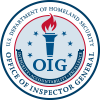We found that none of the three Department of Homeland Security components responsible for end of parole activities—U.S. Customs and Border Protection, U.S. Citizenship and Immigration Services, and U.S. Immigration and Customs Enforcement — were designated to monitor parole expiration and DHS did not have a well-defined process to address parole expiration for aliens paroled into the United States through Operation Allies Refuge/Operation Allies Welcome, Uniting for Ukraine, and processes for Cubans, Haitians, Nicaraguans, and Venezuelans. We also found that DHS did not initiate enforcement actions for parolees whose parole expired. As a result, DHS did not have assurance that former parolees were lawfully present in the United States after parole expiration.
Open Recommendations
| Recommendation Number | Significant Recommendation | Recommended Questioned Costs | Recommended Funds for Better Use | Additional Details | |
|---|---|---|---|---|---|
| 1 | No | $0 | $0 | ||
| We recommend the DHS Secretary designate a DHS component or office to oversee parole expiration for parolees under the reviewed parole processes who are no longer authorized to remain in the United States, and report on the prevalence of this issue. | |||||
| 2 | No | $0 | $0 | ||
| We recommend the Commissioner of CBP and the Director of USCIS develop and implement a process to identify parolees under the reviewed parole processes who are no longer authorized to remain in the United States. | |||||
| 3 | No | $0 | $0 | ||
| We recommend that the Commissioner of CBP and the Director of USCIS develop and implement a process to ensure ICE receives timely, accurate data regarding parolees under the reviewed parole processes who are no longer authorized to remain in the United States. | |||||


